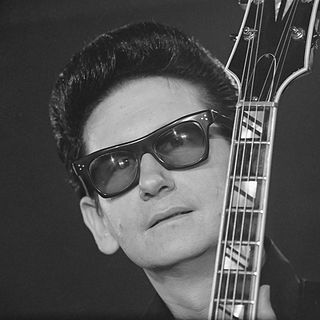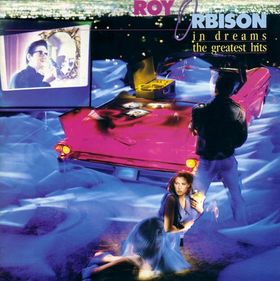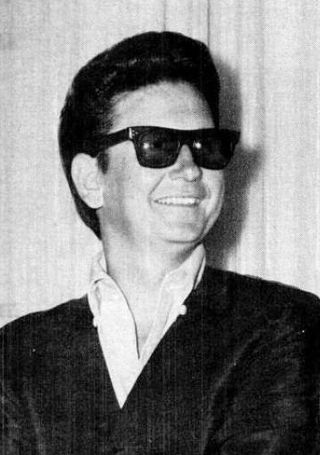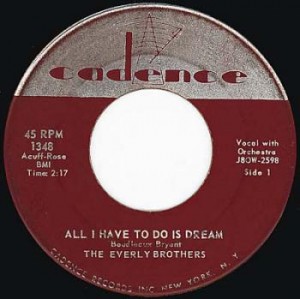Related Research Articles

Roy Kelton Orbison was an American singer, songwriter, and guitarist known for his distinctive and powerful voice, complex song structures, and dark, emotional ballads. Orbison's music is mostly in the rock music genre and his most successful periods were in the early 1960s and the late 1980s. He was nicknamed "The Caruso of Rock" and "The Big O". Many of Orbison's songs conveyed vulnerability at a time when most male rock-and-roll performers projected machismo. He performed with minimal motion and in black clothes, matching his dyed black hair and dark sunglasses.

There Is Only One Roy Orbison is the seventh album recorded by Roy Orbison, and his first for MGM Records, released in July 1965. It features his studio recording of "Claudette", an Orbison-penned song which had become a hit for The Everly Brothers in 1958. Ironically, at the time he recorded the song in 1965, he had divorced his wife Claudette, who had inspired the lyrics. Orbison later re-recorded the song for In Dreams: The Greatest Hits in 1985. The single taken from the album was "Ride Away", which reached no. 25 in the US charts, no. 12 in Australia and no. 34 in the UK. Cash Box described "Ride Away" as a "rhythmic teen-angled ode about a somewhat ego-oriented lad who cuts-out on romance."

In Dreams: The Greatest Hits is a two-record album set by Roy Orbison songs released in 1987 on Virgin Records. It was produced by Orbison and Mike Utley, except for the song "In Dreams", produced by Orbison with T-Bone Burnett and film director David Lynch. All songs are re-recordings by Orbison from 1986, except "In Dreams" from April 1987.

"Only the Lonely (Know the Way I Feel)" is a 1960 song written by Roy Orbison and Joe Melson. Orbison's recording of the song, produced by Fred Foster for Monument Records, was the first major hit for the singer. It was described by The New York Times as expressing "a clenched, driven urgency". Released as a 45 rpm single by Monument Records in May 1960, "Only the Lonely" went to No. 2 on the United States Billboard pop music charts on 25 July 1960 (blocked by Brenda Lee's "I'm Sorry") and No. 14 on the Billboard R&B charts. "Only the Lonely" reached number one in the United Kingdom, a position it achieved on 20 October 1960, staying there for two weeks (out of a total of 24 weeks spent on the UK singles chart from 28 July 1960). According to The Authorized Roy Orbison, "Only the Lonely" was the longest charting single of Orbison's career. Personnel on the original recording included Orbison's drummer Larry Parks, plus Nashville A-Team regulars Floyd Cramer on piano, Bob Moore on bass, and Hank Garland and Harold Bradley on guitars, Joe Melson and the Anita Kerr Singers on backing vocals. Drummer Buddy Harman played on the rest of the songs on the session.

"In Dreams" is a song composed and sung by singer Roy Orbison. An operatic rock ballad of lost love, it was released as a single on Monument Records in February 1963. It became the title track of the album In Dreams, released in July of the same year. The song has a unique through-composed structure in seven movements in which Orbison sings through two octaves, beyond the range of most rock singers.
"Answer Me" is a popular song, originally titled "Mütterlein", with German lyrics by Gerhard Winkler and Fred Rauch. "Mütterlein" was published on 19 April 1952. English lyrics were written by Carl Sigman, and the song was published as "Answer Me" in New York on 13 October 1953. Contemporary recordings of the English lyric by Frankie Laine and David Whitfield both topped the UK Singles Chart in 1953.

Roy Orbison was an American singer-songwriter who found the most success in the early rock and roll era from 1956 to 1964. He later enjoyed a resurgence in the late 1980s with chart success as a member of the Traveling Wilburys and with his Mystery Girl album, which included the posthumous hit single "You Got It". At the height of his popularity, 22 of Orbison's songs placed on the US Billboard Top 40 chart, and six peaked in the top five, including two number-one hits. In the UK, Orbison scored ten top-10 hits between 1960 and 1966, including three number-one singles.
"I Believe" is a popular song written by Ervin Drake, Irvin Abraham, Jack Mendelsohn and Al Stillman in 1953. The most popular version was recorded by Italian-American singer Frankie Laine, and spent eighteen weeks at No. 1 on the UK Singles Chart.
"Dream", sometimes referred to as "Dream (When You're Feeling Blue)", is a jazz and pop standard with words and music written by Johnny Mercer in 1944. He originally wrote it as a theme for his radio program. It has been and performed by many artists, with the most popular versions of this song recorded by The Pied Pipers, Frank Sinatra, and Roy Orbison.
"When" is a popular song written by Jack Reardon and Paul Evans and published in 1958.

"All I Have to Do Is Dream" is a song made famous by the Everly Brothers, written by Boudleaux Bryant of the husband-and-wife songwriting team Felice and Boudleaux Bryant, and published in 1958. The song is ranked No. 141 on the Rolling Stone magazine's list of The 500 Greatest Songs of All Time. The song is in AABA form.

"Heartbeat" is a rockabilly song originally recorded by Bob Montgomery and credited to Norman Petty. It was recorded most famously by Buddy Holly in 1958. The B-side of the single was "Well... All Right". "Heartbeat" reached the UK top 10 twice: once in 1975 for Showaddywaddy at number seven and again in 1992 for Nick Berry, recorded as the theme to the television series Heartbeat, which reached number two.
"A Little Bitty Tear" is a song written by the American country songwriter Hank Cochran. It has been recorded by many musical acts, the first being American recording artist Burl Ives. It has since been recorded by others, including Wanda Jackson, Bing Crosby, Chet Atkins, The Shadows and Cochran himself.
"Let the Good Times Roll" is a song that was recorded by Shirley and Lee in 1956. This song was written by the duo, Shirley Goodman and Leonard Lee.
"Hey Joe!" is a 1953 popular song written by Boudleaux Bryant. It was recorded by Carl Smith for Columbia Records on 19 May 1953 and spent eight weeks at No. 1 on the US country music chart, marking Bryant's first no. 1 record. He later wrote songs with his wife Felice for The Everly Brothers. The song was first published in New York on July 17, 1953 as "Hey, Joe".

"Oh, Pretty Woman", or simply "Pretty Woman", is a song recorded by Roy Orbison and written by Orbison and Bill Dees. It was released as a single in August 1964 on Monument Records and spent three weeks at number one on the Billboard Hot 100 from September 26, 1964, making it the second and final single by Orbison to reach number one in the United States. It was also Orbison's third single to top the UK Singles Chart, where it spent three weeks at number one.
"Jealous Heart" is a classic C&W song written by American country music singer-songwriter Jenny Lou Carson. In the mid 1940s it spent nearly six months on the Country & Western charts. It was subsequently recorded by several pop singers.

Roy Orbison's Sun recordings were made by Orbison at Sun Studio with producer Sam Phillips. Sun Records was established in 1952 in Memphis, Tennessee, and during an eight-year period Phillips recorded such artists as Roy Orbison, B.B. King, Howlin' Wolf, Ike Turner, Rufus Thomas, Elvis Presley, Johnny Cash, Jerry Lee Lewis, Carl Perkins, Harold Jenkins, and Charlie Rich. The musicians signed at Sun Records made music that laid the foundation of rock and roll in the 20th century.
"I'll Be There "' is a song co-written and originally released as a single by American country artist Ray Price. After becoming a major country hit in 1954, the song has been covered by numerous artists such as Cowboy Copas, Elvis Presley, Connie Smith, Johnny Bush, George Jones and Tammy Wynette, Ronnie Milsap, Heather Myles, Martina McBride, Sam Palladio, Don White & Eric Clapton, Willie Nelson, Nick Lowe, Gail Davies and J. J. Cale.
Richard "Dick" Flood, also known as Okefenokee Joe, was an American country music singer-songwriter, entertainer, and environmentalist. In the mid-1950s he was part of the duo The Country Lads and made regular appearances on CBS' The Jimmy Dean Show. In 1959, Flood's cover version of "The Three Bells " reached number 23 on the Billboard Hot 100. His songs have been recorded by other artists, including Roy Orbison, Anita Bryant, Billy Grammer, Kathy Linden, and The Wilburn Brothers. In 1962, The Wilburn Brothers recorded his song "Trouble's Back in Town", which peaked at number 4 on the US Country Chart and was named Cashbox Magazine’s "Country Song of the Year". In 1973, Flood moved to Georgia's Okefenokee Swamp and became a professional naturalist and environmentalist.
References
- 1 2 3 "Everly Brothers - full Official Chart History". Official Charts Company. Retrieved 2023-04-03.
- ↑ Rice, Jo (1982). The Guinness Book of 500 Number One Hits (1st ed.). Enfield, Middlesex: Guinness Superlatives Ltd. pp. 37–8. ISBN 0-85112-250-7.
- 1 2 Aquila, Richard (2022-11-29). Rock & Roll in Kennedy's America: A Cultural History of the Early 1960s. JHU Press. p. 184. ISBN 978-1-4214-4498-7.
- 1 2 Spicer, Mark Stuart; Covach, John Rudolph (2010). Sounding Out Pop: Analytical Essays in Popular Music. University of Michigan Press. p. 32. ISBN 978-0-472-03400-0.
- 1 2 "Roy Orbison Songs Catalog". www.goplanete.com. Retrieved 2023-04-03.
- 1 2 3 Praguefrank (2017-11-06). "Praguefrank's Country Discography 2: Roy Orbison, part 1". Praguefrank's Country Discography 2. Retrieved 2023-04-03.
- 1 2 Office, Library of Congress Copyright (1959). Catalog of Copyright Entries: Third series. p. 78.
- 1 2 Kutner, Jon; Leigh, Spencer (2010-05-26). 1,000 UK Number One Hits. Omnibus Press. ISBN 978-0-85712-360-2.
- ↑ McCall, Michael; Rumble, John; Kingsbury, Paul (2012-02-01). The Encyclopedia of Country Music. Oxford University Press. ISBN 978-0-19-992083-9.
- 1 2 Praguefrank (2016-02-08). "Praguefrank's Country Discography 2: Everly Brothers, part 1". Praguefrank's Country Discography 2. Retrieved 2023-04-03.
- ↑ Larkin, Colin (2011-05-27). The Encyclopedia of Popular Music. Omnibus Press. ISBN 978-0-85712-595-8.
- 1 2 "The Everly Brothers - A Night at the Royal Albert Hall Album Reviews, Songs & More", AllMusic , retrieved 2023-04-03
- ↑ Lonergan, David F. (2005). Hit Records, 1950-1975. Scarecrow Press. p. 34. ISBN 978-0-8108-5129-0.
- 1 2 Henson, Brian (1989). First hits, 1946-1959. Colin Morgan. London: Boxtree. ISBN 1-85283-268-1. OCLC 19389211.
- 1 2 "John Denver - Dreamland Express Album Reviews, Songs & More", AllMusic , retrieved 2023-04-03
- ↑ Billboard. Nielsen Business Media, Inc. 1997-08-02. p. 37.
- ↑ "Status Quo - Famous in the Last Century Album Reviews, Songs & More", AllMusic , retrieved 2023-04-03
- ↑ "Claudette by The Four Pennies - Track Info", AllMusic , retrieved 2023-04-03
- ↑ "Claudette by The Nighthawks - Track Info", AllMusic , retrieved 2023-04-03
- ↑ "Claudette by Cliff Richard - Track Info", AllMusic , retrieved 2023-04-03
- ↑ "Claudette by Robert Johnson - Track Info", AllMusic , retrieved 2023-04-03
- ↑ "Showaddywaddy - The Sun Album (I Betcha Gonna Like It) Album Reviews, Songs & More", AllMusic , retrieved 2023-04-03
- ↑ "Claudette - Roy Orbison", AllMusic , retrieved 2023-04-03